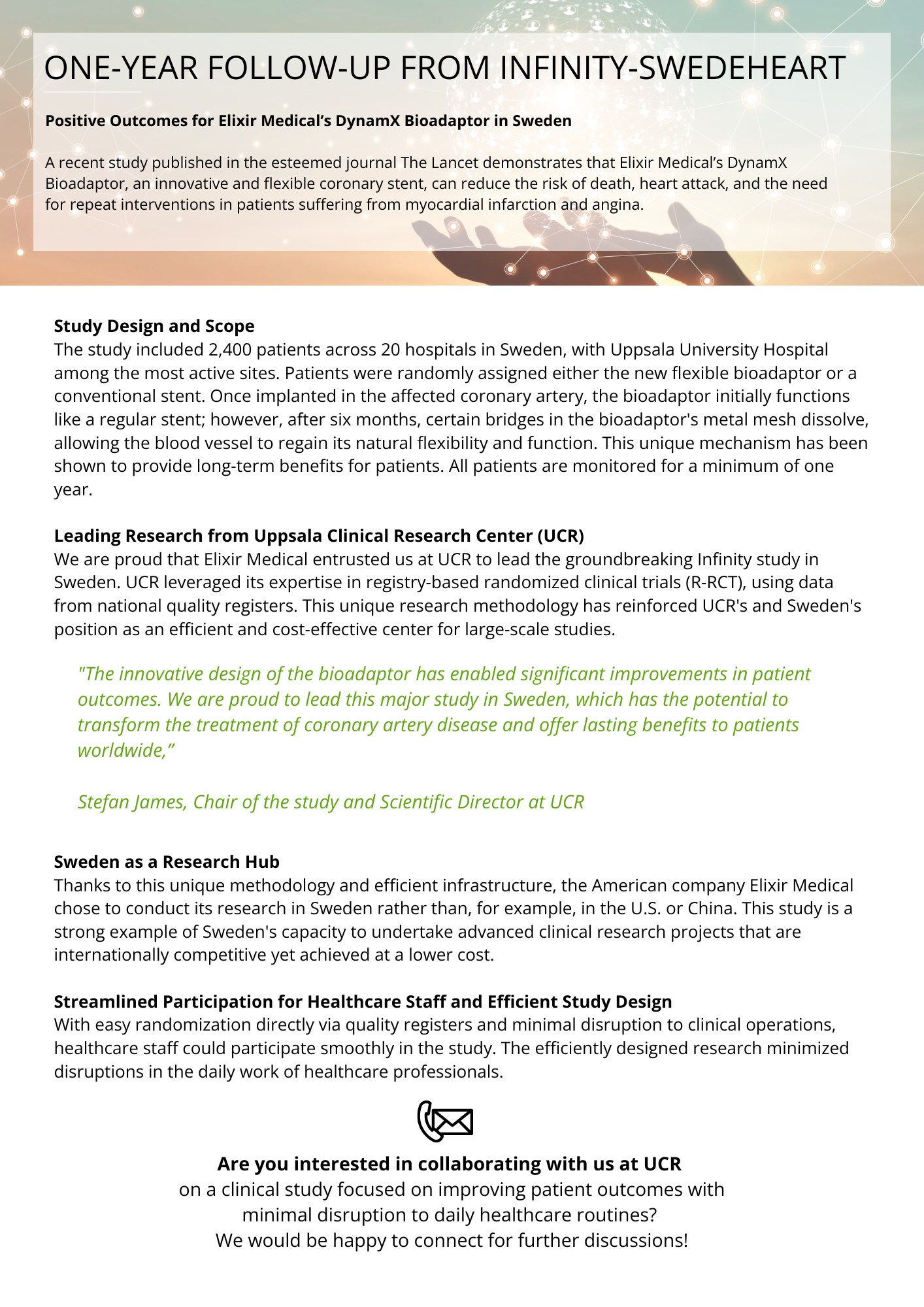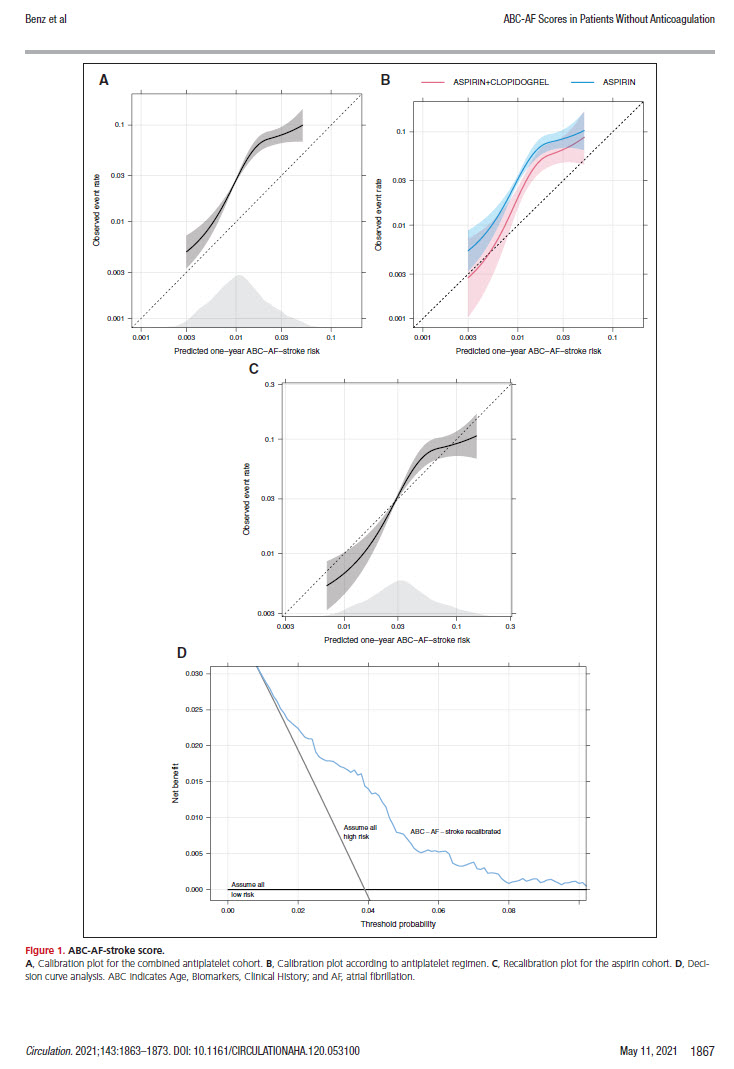No mortality increase with paclitaxel-coated balloons and stents in peripheral arterial disease
An interim analysis from the Swedish Drug-Elution Trial in Peripheral Arterial Disease (SWEDEPAD) has now been presented. It shows that, for patients with lower limb occlusive arterial disease, paclitaxel-coated balloons and stents do not bring about the rise in mortality previously reported. The study, led by the University of Gothenburg and published in The New England Journal of Medicine (NEJM), is expected to resonate internationally.
Peripheral arterial disease (PAD) is common, especially in older people, and causes poor blood circulation. The condition entails stenoses or occlusions of the arteries in the leg. This often causes severe pain, ulcers, and a high risk for lower limb amputation.
The most common treatment is endovascular balloon dilatation, sometimes combined with insertion of stents, small metal-mesh tubes that reinforce the vessel wall and prevent elastic recoil. The procedure, using a catheter inserted into the femoral artery in the groin, is minimally invasive — that is, performed with the least possible surgical trauma to the body.
What the researchers did, as described in the current report, was to compare patients randomly assigned to undergo either dilation of the blood vessel with conventional devices, without any drug coating, or with the more expensive drug-coated devices, all of them using paclitaxel as coating agent. With data on approximately 2,300 patients included to date, the study is by far the largest of its kind in the world.
The finding, that mortality rates in the two different groups do not differ, is expected to be highly influential. The question of a possible increase in mortality among patients treated with paclitaxel coated balloons and stents has been a subject of lively debate in recent years.
Solution to clinical dilemma offered
In December 2018, a meta-analysis of all previous randomized studies was published by Dr Katsanos and co-workers. Surprisingly, the article reported increased mortality among patients who had received treatment with paclitaxel-eluting balloons and stents compared to control patients.
The use of these products then declined sharply all over the world and the U.S. Food and Drug Administration (FDA) was among the organizations that urged caution in using them. In the subsequent discussion, the 2018 results were called in question; but until now no randomized study sufficiently large to settle the matter has been carried out.
The first author of the NEJM article, and also chair of the steering group of this study, is Joakim Nordanstig, associate professor of vascular surgery at Sahlgrenska Academy, University of Gothenburg, and senior vascular surgeon at the Sahlgrenska University Hospital.
“We’re proud and pleased that we in this way were able to provide a solution to the tricky clinical dilemma that arose when long-term patient safety relating to the treatment with paclitaxel-coated balloons and stents was called into question,” Nordanstig says.
“Above all, our results are important for all the patients who are living with PAD and are facing a lower limb arterial procedure. Drug-eluting balloons and stents have been used widely around the world, and currently represent the most promising technique we have for preventing postoperative recurrence of stricture in the dilated artery. That kind of recurrent stricture is by far the most important limitation of invasive interventions in PAD, and it’s something that affects a lot of patients,” he continues.
“It’s also hugely gratifying that Swedish vascular surgery and interventional radiology, working really well together, have truly been able to help solve an international treatment dilemma. Our study is definitely a team effort, and all the vascular surgeons, interventional radiologists and vascular and radiology nurses in Sweden who’ve taken part can stand a bit taller today.”
Reassuring result: new patients to be included
The corresponding author, and also the principal investigator of SWEDEPAD, Mårten Falkenberg, professor of vascular interventions at Sahlgrenska Academy, adds that the study is funded mainly by the Swedish Research Council. It is carried out within the framework of Swedvasc (Sweden’s National Quality Registry for Vascular Surgery), which is administered by the Uppsala Clinical Research Center (UCR) at Uppsala University. UCR is where the study platform was developed and the data processing has taken place. Scientists at UCR have previously conducted several studies of a similar design, and the collaboration between the University of Gothenburg and UCR has been a success factor.
“It’s unusual for an interim analysis to be published in the world’s top-ranking medical journal. The reason for it is that, in all probability, our finding — although it’s a negative one and thus doesn’t demonstrate any differences between the treatment groups — solves a medical dilemma with major clinical and financial implications world-wide,” Falkenberg says.
“With this convincing and reassuring result, we’ve resumed our study, and a further 1,400 patients are now to be included. When it’s all complete, we expect to be able to show whether the new technique, using drug-eluting balloons and stents, improves the outcomes that are most important for patients with peripheral arterial disease; decreased amputation rate and improved quality of life, as this still remains to be proven”, Mårten Falkenberg concludes.
- SWEDEPAD is the first registry-based randomized study in the Swedvasc registry and with its 2300 patients is the, without comparison, the largest study done of balloon dilation in patients with narrowed blood vessels in the legs. The study has been planned to include twice as many patients and will continue to hopefully later also be able to show effects on eg risk of amputation and quality of life, says Stefan James, Professor at the Department of Medical Sciences, Cardiology and scientific leader at Uppsala Clinical Research center,
- The fact that the study is published in the world's most cited scientific journal in medicine shows once again that UCR - as a register center for Swedvasc and co-responsible for the implementation of the study SWEDEPAD - has quality registers and clinical research that is world-leading. This study directly affects the treatment of patients with vascular disease in Sweden and around the world, Stefan James concludes.
Title: Mortality with Paclitaxel-Coated Devices in Peripheral Artery Disease
https://www.nejm.org/doi/full/10.1056/NEJMoa2005206?query=featured_home
Contacts:
Stefan James, senior professor i Kardiologi
Uppsala Kliniska Forskningscentrum och Institutionen för Medicinska Vetenskaper
Uppsala Universitet, Uppsala
Email: This email address is being protected from spambots. You need JavaScript enabled to view it.
Tel: 018-6119500




